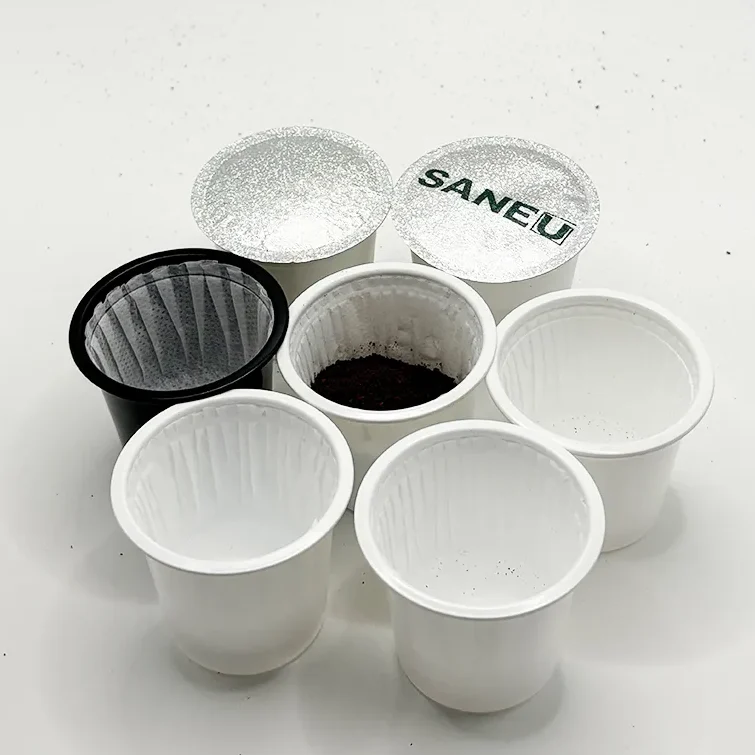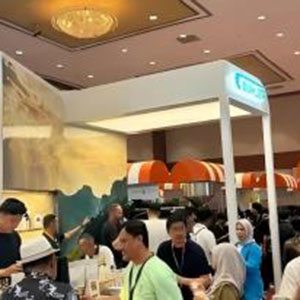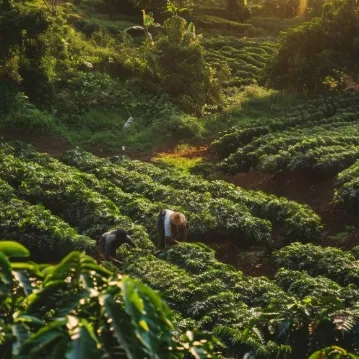Grabbing a freshly brewed cup of coffee at home by simply pressing a button, the convenience and time-saving features of the K-Cup are undeniable. Since K-Cups came out, K-Cups have revolutionized the at-home and office coffee consumption experience, brewing not just a cup of black coffee but also a massive market. Globally, billions of K-Cups are sold each year. However, governments and consumers are all aware of the environmental cost caused by K-Cups. The sheer volume of single-use coffee pods entering our waste streams has sparked considerable debate: are K-Cups recyclable, and if so, how do we recycle them? Public estimates suggest that over tens of billions of K-Cups are sold annually worldwide, translating to a significant amount of waste ending up in landfills.

So, what exactly is a K-Cup made from? Plastic? What kind of Plastic? Typically, a standard K-Cup is composed of several key components: a #5 polypropylene plastic cup, an aluminum lid, a filter, and the coffee grounds. This multi-material construction is central to the recycling challenge. But what about those similar single-serve pods from other brands, private label K-Cup Coffee Capsules? These “compatible” empty coffee pods may look and function similarly to the standard coffee capsules, but what about their materials? Some may also use #5 polypropylene, while others might utilize different types of plastics or even compostable materials in some newer offerings.
In this post, we will dig into the materials that make up name-brand and private-label K-Cup empty coffee capsules. Then, we’ll provide a comprehensive guide on whether those materials are recyclable.
Uncover K-Cup: What Materials Inside?
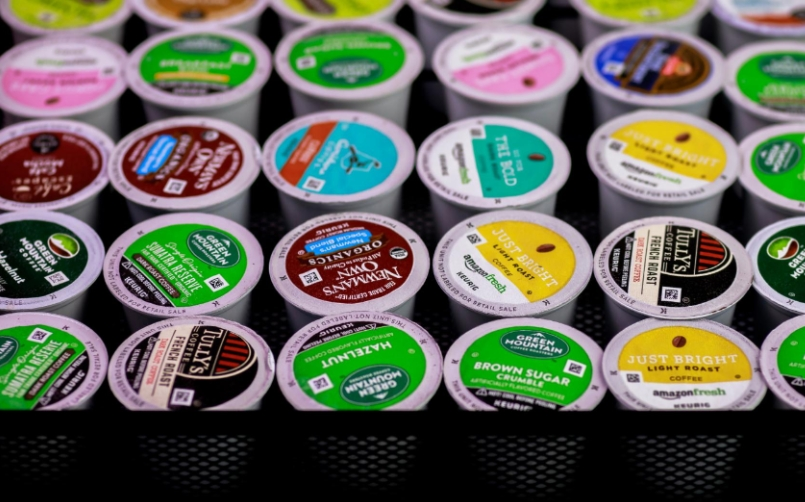
- The Plastic Cup: The main body of a traditional and standard K-Cup is made from #5 polypropylene (PP) plastic. Plastic numbers range from #1 to #7. The #5 PP plastic is generally considered recyclable in many regions across the world. However, K-Cups pose challenges for sorting equipment at recycling facilities since the body is small.
- The Lid: The top of the K-Cup is sealed with an aluminum foil lid. Aluminum is a highly recyclable material, but it needs to be separated from the plastic cup to be processed effectively.
- The Filter: Inside, you’ll find a paper filter that holds the coffee grounds or tea leaves. This filter is typically made from natural fibers like abaca fiber.
- The Contents: K-Cup contains coffee grounds or other beverage ingredients. These are organic matter.
Private Label and Other Brand K-Cups:
The market of single-serve coffee pods has expanded significantly beyond K-Cups’ original offerings. Here’s what you might encounter with private label and other compatible pods:
- Plastic Variations: While many compatible pods also use #5 polypropylene, some may use other types of plastics. Unfortunately, without specific labeling, it can be difficult to determine the exact plastic resin used. This uncertainty can complicate recycling efforts, as different plastics require different recycling processes. You could check the bottom of your coffee capsules to find which # plastic is used. Worthwhile, most private-label empty K-Cup coffee capsules are made of PP-EVOH. It is a composite multi-layer material that is user-safe.
- Compostable K-Cup Capsules: Currently, you probably notice “compostable” single-serve pods online. These are often made from plant-based materials designed to break down in industrial composting facilities. It’s crucial to note that “compostable” does not mean they are recyclable in your blue bin. They need to be disposed of in designated organic waste streams, which may or may not be readily available for all regions.
PET is one of the most widely used plastics globally, often used to contain water and pop bottles. It is single-use, recyclable, but not reusable. Notably, repeated use increases the risk of leaching and bacterial growth.
HDPE is the stiff plastic normally used to pack milk, detergent, and oil, and some plastic bags. HDPE is the most commonly admitted recycled plastic and a safe plastic.
PVC is a soft, flexible form of plastic used to make wrapping packages, soft cooking oil bottles, toys, and blister packaging like yogurt/jam/butter.
#4 made products are often not recycled. LDPE is generally used in wraps, dry cleaner bags, squeezable bottles, and the type of plastic bags for packaging bread.
Polypropylene is tough and lightweight, and good heat resistance. It is treated as reuse-safe.
Polystyrene is a cheap, lightweight, and easily formed plastic. It is most often used to produce disposable foam drinking cups, take-out food containers, egg cartons, and plastic picnic cutlery
For health, you’d better avoid using products made from #7 in the maximum
- Lid Materials: While aluminum is common, some alternative empty coffee pods might use different metallic foils or even plastic-based seals. For your safety, you need to keep away from plastic-based seal lids since the coffee brewing machines usually release high pressure and hot water during brewing.
- Filter Variations: The paper filter is a fairly standard component, but the type of paper or its treatment could vary. Most private label coffee capsules are equipped with a non-woven filter which is also compostable.
How to Recycle Your K-Cups?
How did you recycle these little coffee capsules in the past? Indeed, there are straightforward or 100% right recycling approaches since every region has its own regulations on recycling plastic products.
Given the mixed coffee capsule materials and small size, simply throwing a whole K-Cup into your blue bin would not result in recycling.
Here’s a recommended approach to maximize your recycling chances:
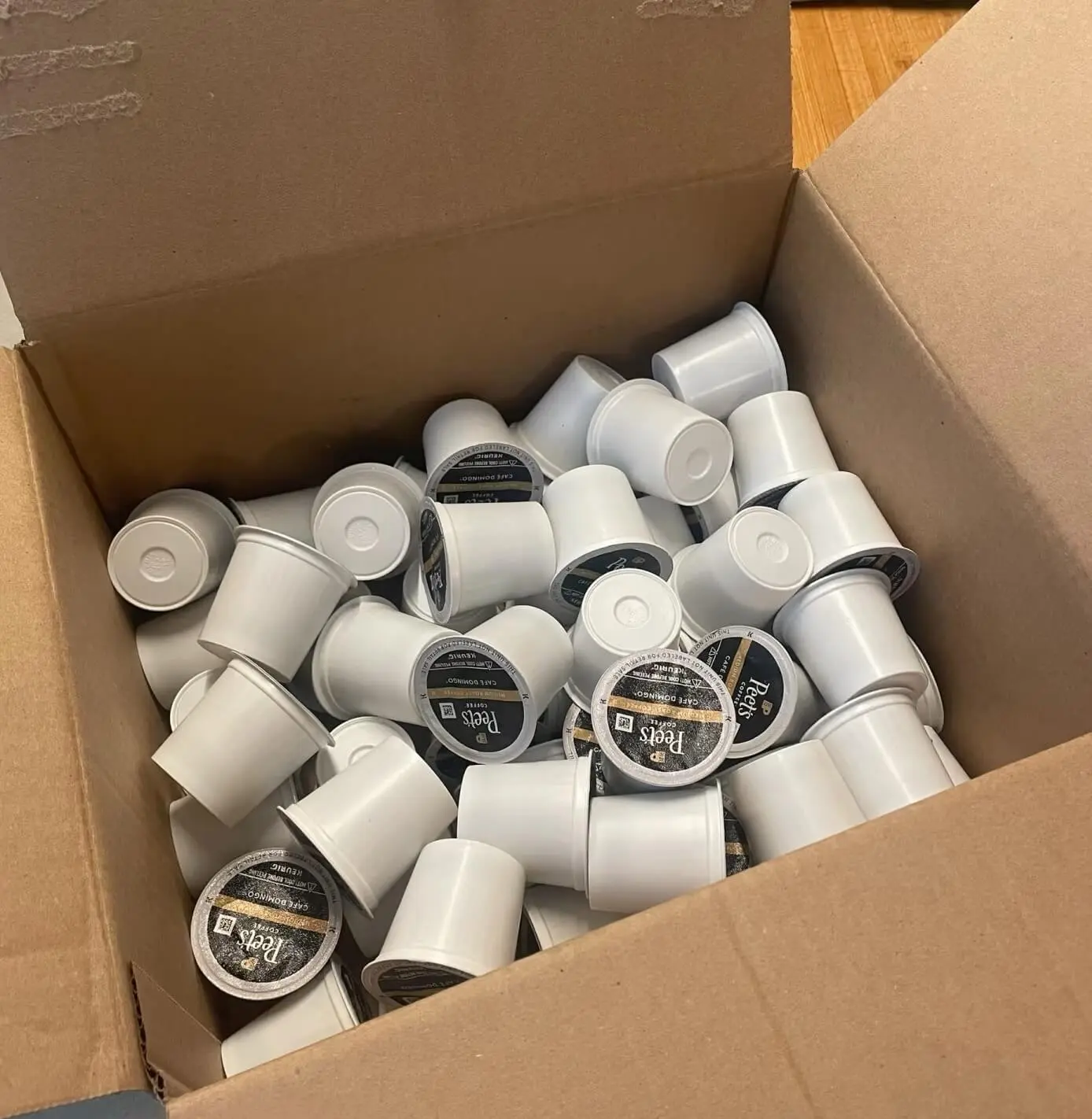
- Cool Down the Brewed Coffee Capsules: After brewing, let the K-Cup cool completely.
- Peel Off the Aluminum Lid: Carefully peel off the aluminum foil lid. You can try to gather a few lids together to increase their size and prevent them from getting lost during sorting at the recycling facility. Besides, you might purchase some needles or special tools that help you avoid lacerations.
- Remove the Filter and Grounds: Empty out the coffee grounds and remove the paper filter. These should ideally be composted in your green bin if your municipality offers organic waste collection. Coffee grounds are great for gardens!
- Rinse the Plastic Cup: Give the empty plastic cup a quick rinse to remove any remaining coffee residue. This helps prevent contamination of the recycling stream.
- Check your local Guidelines for #5 Plastic: While #5 polypropylene is generally accepted in some regions’ recycling programs, it’s always best to consult the official guidelines provided by the City council.
- Place Separated Components in the Correct Bins: Place the rinsed plastic cup in your blue recycling bin. Consider grouping several cleaned cups together in a larger recyclable container to prevent them from getting lost. Place the aluminum lids, preferably grouped, in your blue bin as well.
Beyond recycling by yourself, you might learn about the K-Cup’s official sustainability program and join in on it.
Recycling Private Label and Other Brand K-Cups:
The process for recycling private-label K-Cups largely depends on the materials they are made from:
- If They Are Clearly Labeled as #5 Plastic with Aluminum Lids: Follow the same separation and cleaning steps outlined above.
- If You Suspect Different Plastics: Without clear identification, it’s difficult to know if these plastics are accepted in the recycling program. You probably try to contact the seller and ask for recycling methods. Otherwise, the pod is more likely to end up in the landfill.
- If They Are Labeled as “Compostable”: These might go into your green organic waste bin in some countries, like Canada, once you can make sure the entire pod (cup, lid, and filter) is certified compostable. Check your local municipal guidelines for accepted compostable materials.
Learning About SANEU K-Cups
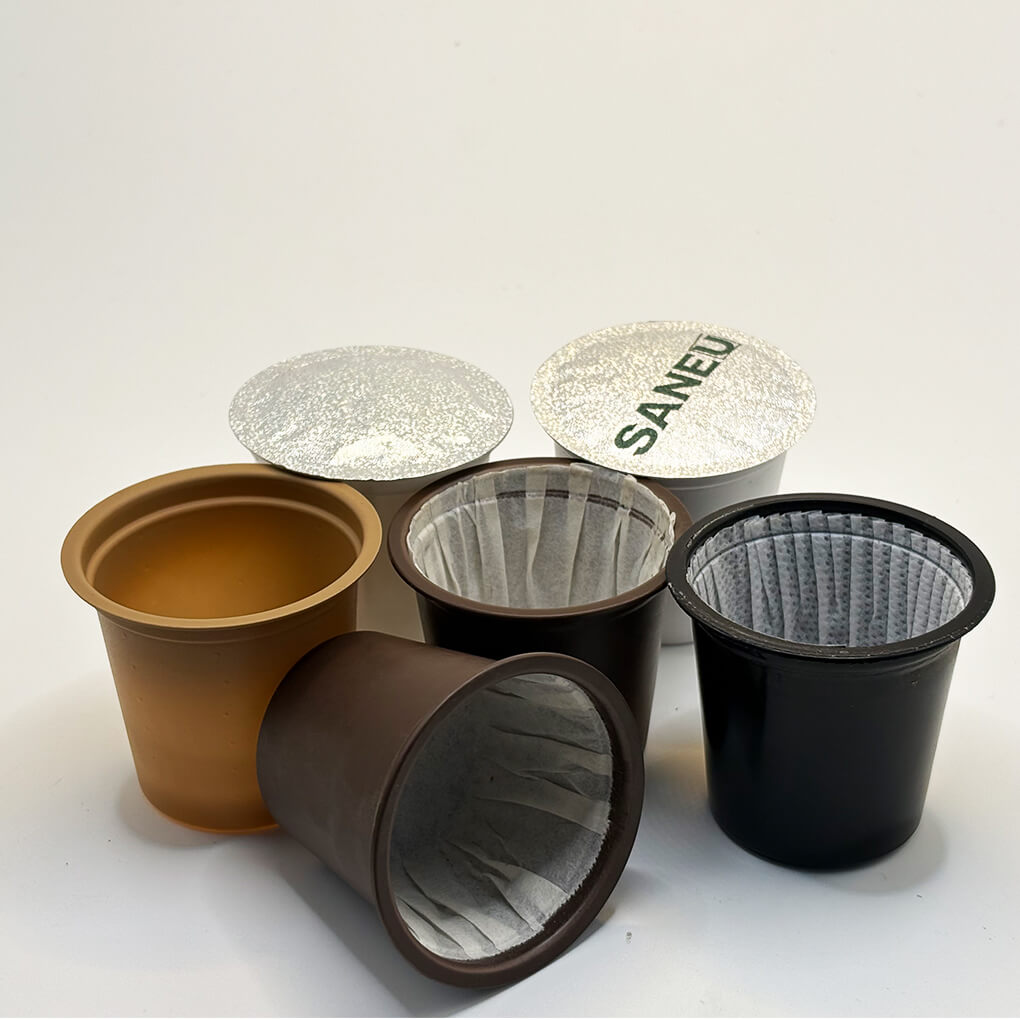
#5 PP Coffee Capsules
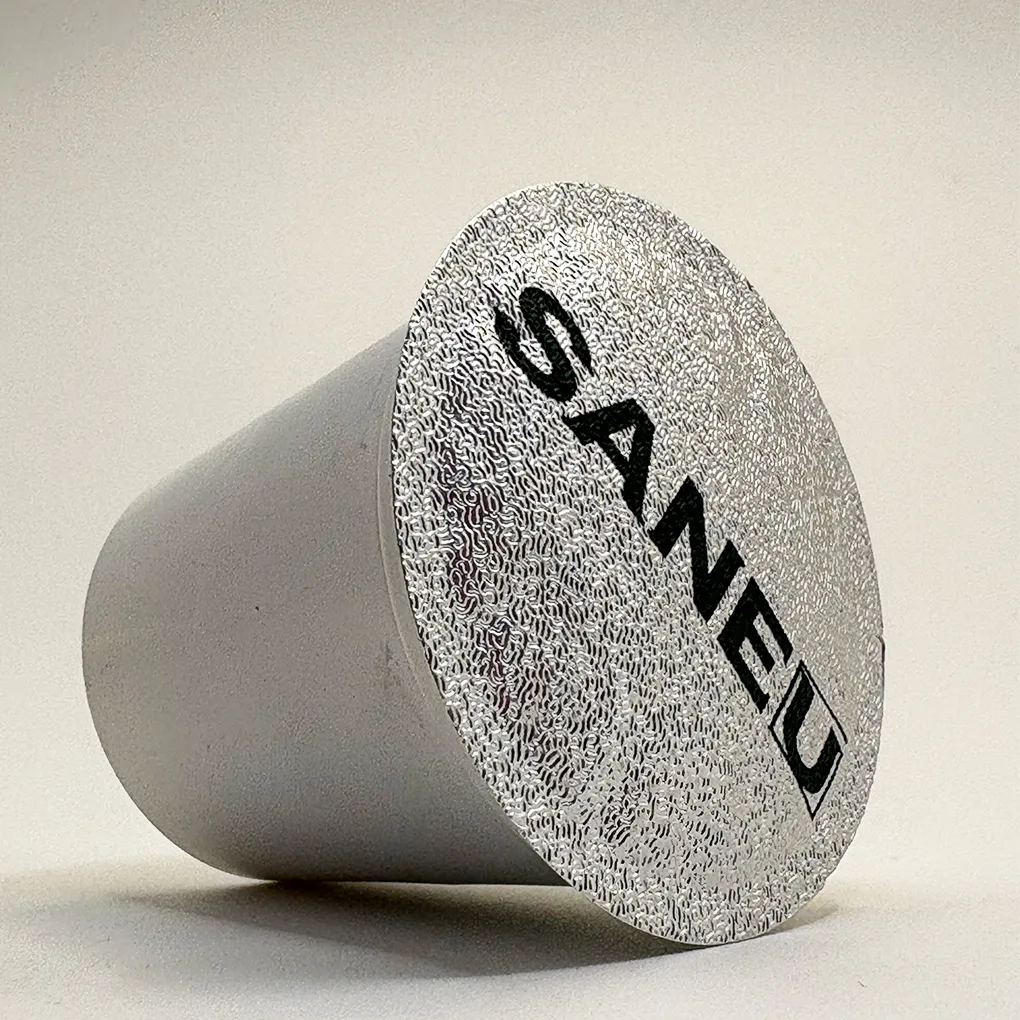
Alu Pre-cut Lid K-Cup
